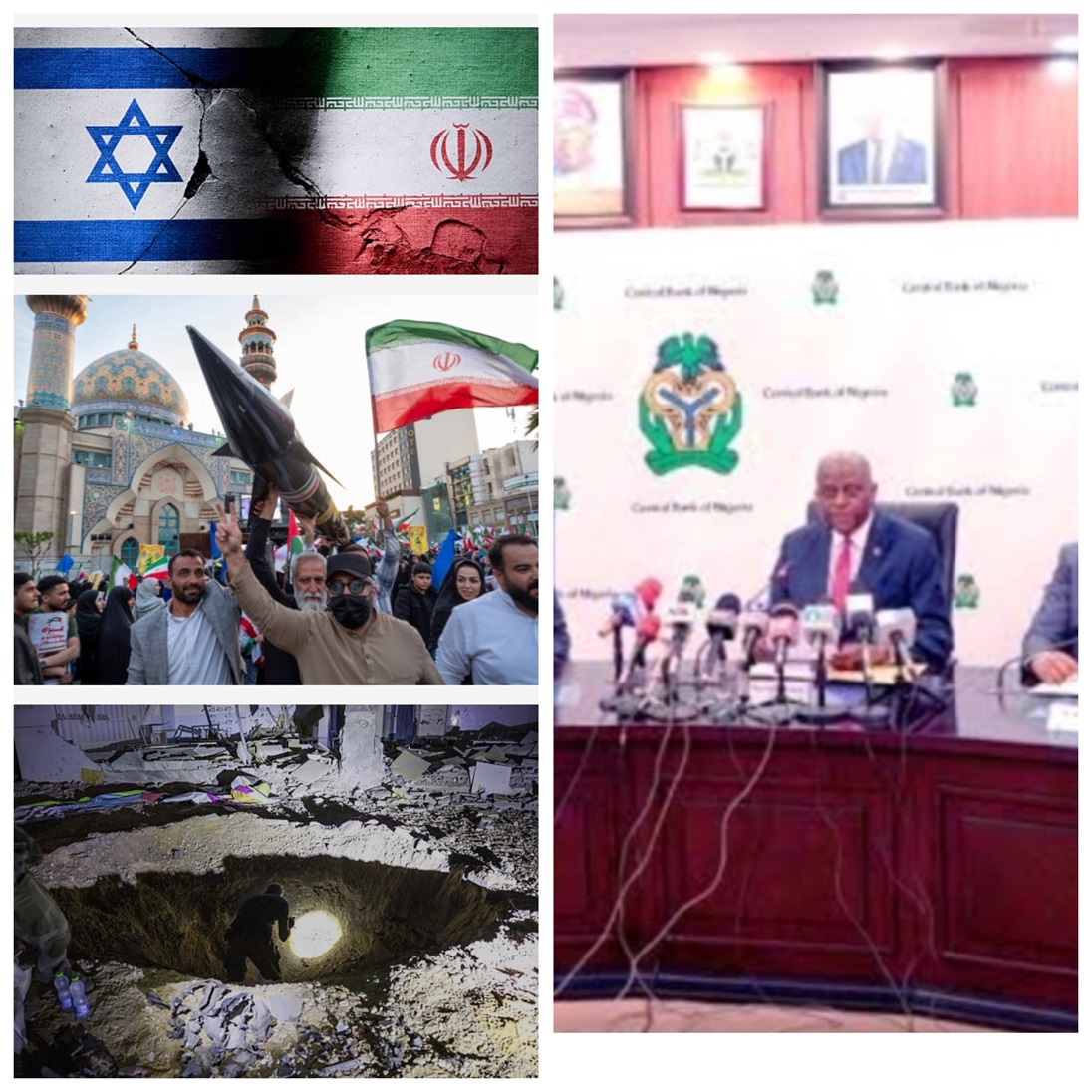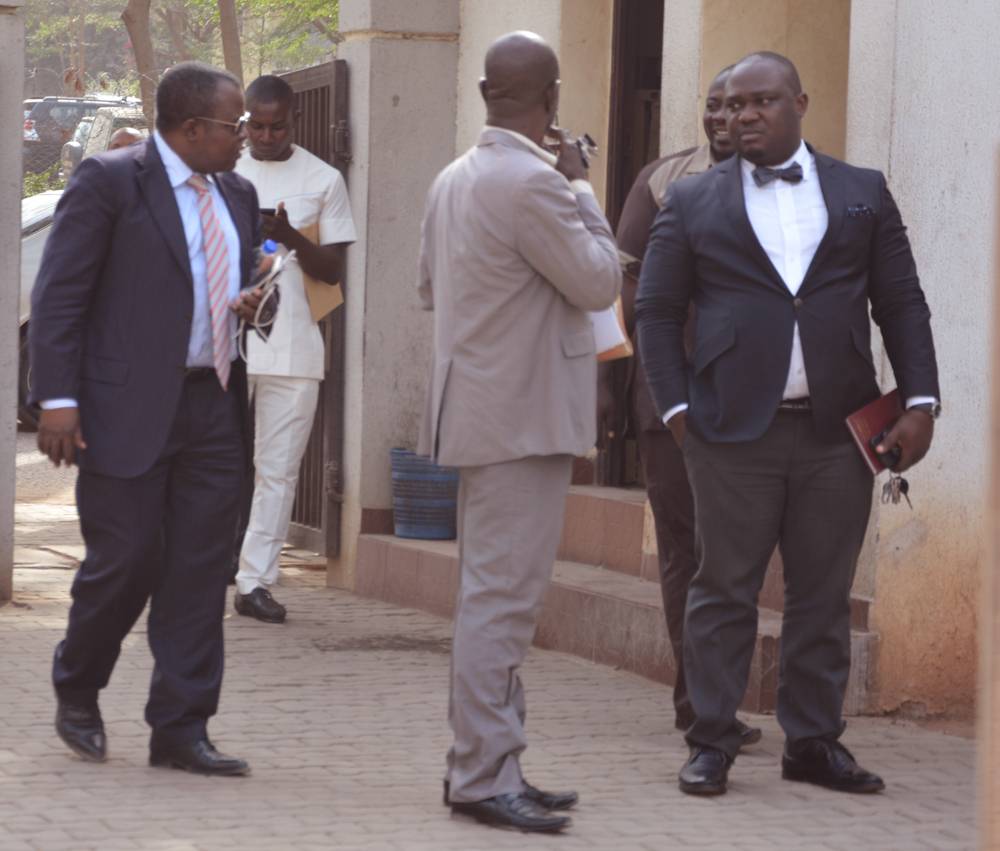Feature/OPED
Missing Charity Aiyedogbon: One Year After


Destiny Ugorji
It is exactly one year that an Abuja-based business woman, Charity Aiyedgbon was declared missing by her Facebook friends. Charity, popularly known as ‘Chacha’, is said to have gone missing since the 9th of May, 2016 and family, friends and Security Agencies said to be working to unravel the mystery behind her sudden disappearance.
Speculations on the possible whereabouts of the 44-year-old mother of four, also known as Deepdeal Chacha Dehammer were rife.
First, a Lagos-based lawyer, Emeka Ugwuonye said he had overwhelming evidence that the missing Charity was dead, accusing her erstwhile husband, David Aiyedogbon of having a hand in her disappearance; an allegation he posted on his Facebook group, The Due Process Advocates.
Reacting to Ugwuonye’s allegation, former husband of the missing woman, Mr. David Aiyedogbon washed his hands over the disappearance of the lady and wrote his accuser, through his lawyers, demanding an apology, failure which he would seek legal redress.
The letter titled: “Defamation of the character of David Aiyedogbon; demand for apology,” signed by his lawyer, Obiora Illo esq (Ogbulafor Chambers) and made available to newsmen, expressly states: “It is our instruction to demand an unqualified apology from you to our client through our chambers for the defamatory publications you have made of and concerning our client.”
Also, addressing newsmen in Abuja, Mr. Aiyedogbon urged the Inspector General of Police, Ibrahim Idris to investigate the allegation against him, describing it as “cruel, criminal and untrue”, stressing that his estranged wife Charity left their matrimonial home on the 28th of May, 2014, noting that since then, he had neither heard from her, nor had any dealings with her.
While the controversy lasted, a Civil Society Organisation, Coalition against Crime (CAC) called on Nigeria’s Inspector General of Police, Ibrahim Idris to arrest Lagos-based lawyer, Ugwuonye to explain his role in the disappearance of Charity Aiyedogbon.
National Coordinator of the group, Harrison Pepple, made the call while addressing newsmen in Abuja, arguing that Mr. Ugwuonye had some questions to answer.
In a Petition to the Inspector General of Police, the group quoted Mr. Ugwuonye as saying: “…Charity Aiyedogbon is said to have been missing since the 11th of May, 2016 and one Emeka Ugwuonye claims he has evidence that the woman is dead and was murdered. He also posted a photograph of a dead person, part of whose body was dismembered. How can Police be looking for a missing person and someone says he has a clue and he has not been invited or arrested.”?
Following the intervention by the Civil Society Organisation, the Police eventually arrested Mr. Ugwuonye and later released him on bail, after questioning, while investigations continued.
Several developments aided Police investigations. First, those believed to be close to Chacha are quoted as saying that she went missing on the 9th of May, 2016, but her lawyer, Barrister Nsikak Udoh, handling a suit filed at the Federal High Court, Lokoja on 29th April, 2016 against 29 respondents, including her biological children and former husband, claimed she (Chacha) came to his house on the 18th of May, 2016 (eight days after her purported disappearance) and one of his staff accompanied her to Federal High Court, to sign and depose to an affidavit in support of the ex-parte motion filed along with the case. How could someone who was declared missing on the 9th of May reappear on the 18th and then disappear again?
Today, it has been established that Chacha’s signature was forged; as the lawyer, Barrister Nsikak Udo has recanted. He says he did not see Chacha, as earlier claimed. He confessed to the Police that he forged Charity’s signature in an affidavit he filed in court. Apparently, Charity was not behind the filing of the suit, but her lawyer, Barrister Nsikak Udoh. He therefore lied on oath. Both himself and the Commissioner for oaths in the Federal High Court Abuja jurisdiction risk being prosecuted by the Police for forgery and perjury.
Another puzzle is that a corpse, said to have been dismembered beyond identification was allegedly seen in Abuja on the 12th of May and Mr. Ugwuonye claimed it was Chacha’s body. Till date, who has identified the corpse as that of Chacha? Impeccable sources say a DNA test conducted on the body revealed otherwise. Children of the missing woman have also chorused on several platforms that their mother was NOT dead. They have also stated that the displayed corpse is not that of their mother. The missing woman also has siblings and parents who have been going about their normal businesses and have neither said their sister was missing, dead, nor joined in the search for her.
The missing Chacha has a case of forgery that is yet to be concluded. A suit instituted in a High Court of the Federal Capital Territory (FCT High Court 8) on the 14th of March, 2016, with suit number CV/1231/16, between Messrs Chibuzor Ogugua and Chigozie Eme (plaintiffs) and Mrs. Charity Aiyedogbon (defendant), made eight prayers to the Court. The last prayer reads: “an order of the Honourable Court directing the defendant to pay the plaintiffs the sum of 200,000,000.00 (Two Hundred Million Naira) as damages for the losses suffered on the ground of the unauthorized and fabricated Valuation Report by the defendant.”Could she have disappeared to frustrate the Suit or evade justice?
In the last one year, a lot has happened. The law enforcement agencies and private investigators have worked very hard to unravel the mystery behind the disappearance of Mrs. Charity Aiyedogbon, aka Chacha Dehammer. Cases have been instituted and some already decided.
Some friends of Chacha, believed to have earlier raised the alarm recanted. They are said to be at war with Emeka Ugwuonye, who said he was briefed by same Chacha’s friends on the matter. They engaged in war of words on Facebook. One of them, Pamela Nwansoh allegedly confronted Mr. Ugwuonye in a Police premises in Abuja over an obvious sense of disenchantment with his activities, alleging extortion of members of the public (in the name of looking for Chacha) using his Facebook Group, the Due Process Advocates (DPA). Ugwuonye had, via a post on the group, solicited financial contributions for his trip to Abuja to respond to Police invitation to explain himself over the case of the missing Chacha.
One of the ladies said to be involved in the search for Chacha, Viola Ifeyinwa Okolie, on the 14th of July, 2016, also made a worrisome post on her Facebook wall, expressing disenchantment with Mr. Ugwuonye’s antics.
Also in a post on The Due Process Advocates on the 17th of July, 2016, Ugwuonye attacked Viola Okolie, making spurious allegations. The post was titled: “How the search for Chacha took strange turns and her friends turn out not to be friends after all.” The drama continued.
But, how did Emeka Ugwuonye get involved in this matter? Was he really in America when the incident happened, as he claimed? Available records suggest otherwise.
Barrister Ugwuonye claimed to have been in the United States of America as at the time of Chacha’s disappearance and only came into Nigeria in June, 2016, after being briefed to handle the matter, but his call log betrayed him, showing that he was in Abuja on the 10th, 11th and 12th of May, 2016; same time Chacha is said to have got missing. Information from private investigators and telecommunication service providers revealed that he made calls around Jabi area of Abuja, up till midnight same 10th and 11th and departed Abuja on the 12th of May, 2016. When confronted by the Police in Abuja with evidence of his movement, he owned up.
Three key suspects earlier arrested by the Police in connection with Chacha’s disappearance were said to have been released at his instance. He claimed at the FCT Police Hqrs that they were his clients; but when brought face to face with Mr. Ugwuonye, they denied all his claims, saying they neither briefed him nor identified any corpse to him as that of Chacha.
As at today, Police sources reveal that Mr. Ugwuonye has not provided any evidence to substantiate his claims. The only person he claims showed and identified the corpse as that of missing Chacha (Jo) denied him.
Today, Chacha’s car has been recovered. Two of her handsets have also been recovered. Is it a coincidence that he (Ugwuonye) has been questioned more than thrice by the Police in Chacha’s case?
The first puzzle is solved, with the admission by one of Chacha’s lawyers, Barrister Nsikak Udo that Chacha’s signature was forged. He admitted that he lied on oath and his fate shall be determined by the laws of the land soon.
Second, Chacha’s last Facebook post before she ‘went missing’ shows that she sat on the passenger’s seat of her car. That was the last she posted on Facebook, using that particular User ID- Deepdealdehammer. The question of who drove the car may have also been addressed.
Her car has been recovered, following a tip-off by one of the suspects that were in Police custody, IK Ezeugo. IK never opened up until Police arrested one of Jekwu’s friends, who now gave the lead, indicating that he (IK) personally drove the vehicle to the place where it was parked. His (Ik’s) younger brother, identified as Paul Chukwujekwu Ezeugo (still at large) is believed to have been in custody of the vehicle. He (Chukwujekwu) is also believed to have driven the missing woman on that last trip. The car was found in Enugu State by the Police, in the residence of one Uche, with its Plate Number and particulars already changed.
Again, Chacha’s two handsets have been recovered. One of them, a Nokia handset, is said to have been found with Chukwujekwu’s biological mother, Mrs. Ezeugo. The second handset (a Samsung phone) was recovered from one Augustine, who claimed that one Odinaka, Chukwujekwu’s friend and phone repairer sold it to him for Twenty Five Thousand Naira. The proceeds, according to Odinaka, were handed over to Chukwujekwu. Just like the vehicle, the both handsets were found in Enugu. Chukwujekwu is still at large.
Why is it that almost all the persons arrested/suspected so far in connection with Chacha’s case are from Enugu State? Precisely, six suspects so far arrested in the case are from Enugu State. Emeka Ugwuonye is from Enugu and Chacha’s car and handsets were found in Enugu. Chacha’s maternal home is Enugu. In fact, Paul Chukwujekwu Ezeugo and the missing Chacha’s mother are both from Oba-Nsukka, in Enugu State.
Mr Ugwuonye’s relationship with one of the prime suspects, Chukwujekwu Ezeugo is suspicious and his call log points in the same direction. He is also suspected to have aided his escape, as, according to Police sources, the day he (Jekwu) was to be arrested, Ugwuonye personally called the Police, promising to produce him, only to revert 24hours later, telling the Police that he had escaped.
Understanding how bad the matter was getting, Ugwuonye at a point, announced his withdrawal from Chacha’s case, a move Police sources described as diversionary, since he is already a suspect in the case.
David Aiyedogbon fights back
Following his refusal to apologize, ex-husband of the missing woman, Mr. David Aiyedogbon dragged Lagos- based Lawyer, Emeka Ugwuonye to the Nigerian Bar Association (NBA) over what he described as unprofessional publications against his person.
A letter dated 22nd August, 2016, captioned: “Petition against Emeka Ugwuonye for Unprofessional Publications and False Allegations”, addressed to the General Secretary of the Nigerian Bar Association (NBA), urged the professional body to investigate the matter and invoke appropriate disciplinary actions against the lawyer. Till date, Mr. Ugwuonye has not responded to a query issued him by the NBA, following Aiyedogbon’s petition.
Also, for falsely accusing him of, having a hand in the sudden disappearance of his estranged wife, Charity Aiyedogbon, Mr. Aiyedogbon instituted a defamation of character suit of Ten Billion Naira (N10b) against Lagos Lawyer, Emeka Ephraim Ugwuonye.
The Suit, with number CV/2750/16, between David Aiyedogbon (Plaintiff) and Emeka Ugwuonye (Defendant) on defamation of character, before Justice Peter Kekemeke of Federal Capital Territory (FCT) High Court 14, Apo Abuja; also prays that the defendant be ordered to pay the cost of the suit.
The Plaintiff is also seeking an order of perpetual injunction “restraining the Defendant, his Agents, Privies, Associates or whosoever called” from making further defamatory publications against him and his family members. The matter is adjourned to Thursday, 18th May, 2017.
Sources also reveal that Mr. Aiyedogbon’s lawyer, Tony Ogbulafor may have also filed a personal suit against Mr. Ugwuonye for wrongly accusing him of giving a bribe (in an envelope) to a Police man to detain him.
Police sources also reveal that, while some persons have already been charged to Court (awaiting trial) for their roles in the disappearance of Charity Aiyedogbon, others that have questions to answer will also be charged soon, to explain their roles in the controversy.
Meanwhile, the suit purportedly filed by Chacha at the Federal High Court, Lokoja, wherein Barrister Nsikak Udoh represented her has been decided in favour of David Aiyedogbon.
One year after, Chacha’s case is getting more interesting. We await the explanation of those in possession of Chacha’s car and handsets on their roles, accomplices and her whereabouts.
While we wait patiently for the unfolding drama, the Police must realise that Nigerians and indeed the world are watching. They must address Nigerians now on the extent of their investigation.
Again, Police must expedite actions in charging suspects to court. Waiting endlessly on the matter does not help the course of justice.
One is still at a loss as to why the prime suspect in the matter, Jekwu is yet to be declared wanted; and why Charity Aiyedogbon has not been declared missing. The Police must clear the air now.
As the whereabouts of Charity Aiyedogbon remain unknown, I join millions of Nigerians to demand that Emeka Ugwuonye provides his “overwhelming evidence” regarding what happened to Chacha or get prosecuted for false information and criminal conspiracy.
Feature/OPED
Gen Alpha: Africa’s Digital Architects, Not Your Target Audience

By Emma Kendrick Cox
This year, the eldest Gen Alpha turns 16.
That means they aren’t just the future of our work anymore. They are officially calling for a seat at the table, and they’ve brought their own chairs. And if you’re still calling this generation born between 2010 and 2025 the iPad generation, then I hate to break it to you, but you’re already obsolete. To the uninitiated, they look like a screen-addicted mystery. To those of us paying attention, they are the most sophisticated, commercially potent, and culturally fluent architects Africa has ever seen.
Why? Because Alphas were not born alongside the internet. They were born inside it. And by 2030, Africa will be home to one in every three Gen Alphas on the planet.
QWERTY the Dinosaur
We are witnessing the rise of a generation that writes via Siri and speech-to-text before they can even hold a pencil. With 63% of these kids navigating smartphones by age five, they don’t see a QWERTY keyboard as a tool. They see it as a speed bump, the long route, an inefficient use of their bandwidth. They don’t need to learn how to use tech because they were born with the ability to command their entire environment with a voice note or a swipe.
They are platform agnostic by instinct. They don’t see boundaries between devices. They’ll migrate from an Android phone to a Smart TV to an iPhone without breaking their stride. To them, the hardware is invisible…it’s the experience that matters.
They recognise brand identities long before they know the alphabet. I share a home with a peak Gen Alpha, age six and a half (don’t I dare forget that half). When she hears the ding-ding-ding-ding-ding of South Africa’s largest bank, Capitec’s POS machine, she calls it out instantly: “Mum! Someone just paid with Capitec!” It suddenly gives a whole new meaning to the theory of brand recall, in a case like this, extending it into a mental map of the financial world drawn long before Grade 2.
And it ultimately lands on this: This generation doesn’t want to just view your brand from behind a glass screen. They want to touch it, hear it, inhabit it, and remix it. If they can’t live inside your world, you’re literally just static.
The Uno Reverse card
Unlike any generation we’ve seen to date, households from Lagos to Joburg and beyond now see Alphas hold the ultimate Uno Reverse card on purchasing power. With 80% of parents admitting their kids dictate what the family buys, these Alphas are the unofficial CTOs and Procurement Officers of the home:
-
The hardware veto: Parents pay the bill, but Alphas pick the ISP based on Roblox latency and YouTube 4K buffers.
-
The Urban/Rural bridge: In the cities, they’re barking orders at Alexa. In rural areas, they are the ones translating tech for their families and narrowing the digital divide from the inside out.
-
The death of passive: I’ll fall on my sword when I say that with this generation, the word consumer is dead. It implies they just sit there and take what you give them, when, on the contrary, it is the total opposite. Alphas are Architectural. They are not going to buy your product unless they can co-author the experience from end to end.
As this generation creeps closer and closer to our bullseye, the team here at Irvine Partners has stopped looking at Gen Alpha as a demographic and started seeing them as the new infrastructure of the African market. They are mega-precise, fast, and surgically informed.
Believe me when I say they’ve already moved into your industry and started knocking down the walls. The only question is: are you building something they actually want to live in, or are you just a FaceTime call they are about to decline?
Pay attention. Big moves are coming. The architects are here.
Emma Kendrick Cox is an Executive Creative Director at Irvine Partners
Feature/OPED
Why Digital Trust Matters: Secure, Responsible AI for African SMEs?

By Kehinde Ogundare
For years, security for SMEs across sub-Saharan Africa meant metal grilles and alarm systems. Today, the most significant risks are invisible and growing faster than most businesses realise.
Artificial Intelligence has quietly embedded itself into everyday operations. The chatbot responding to customers at midnight, the system forecasting inventory requirements, and the software identifying unusual transactions are no longer experimental technologies. They are becoming standard features of modern business tools.
Last month’s observance of Safer Internet Day on February 10, themed ‘Smart tech, safe choices’, marked a pivotal moment. As AI adoption accelerates, the conversation must shift from whether businesses should use AI to how they deploy it responsibly. For SMEs across Africa, digital trust is no longer a technical consideration. It is a strategic business imperative.
The evolving threat landscape
Cybersecurity threats facing sub-Saharan African SMEs have moved well beyond basic phishing emails. Globally, cybercrime costs are projected to reach $10.5 trillion this year, fuelled by generative AI and increasingly sophisticated social engineering techniques. Ransomware attacks now paralyse entire operations, while other threats quietly extract sensitive customer data over extended periods.
The regional impact is equally significant. More than 70% of South African SMEs report experiencing at least one attempted cyberattack, and Nigeria faces an average of 3,759 cyberattacks per week on its businesses. Kenya recorded 2.54 billion cyber threat incidents in the first quarter of 2025 alone, whilst Africa loses approximately 10% of its GDP to cyberattacks annually.
The hidden risk of fragmentation
A common but often overlooked vulnerability lies in digital fragmentation.
In the early stages of growth, SMEs understandably prioritise affordability and agility. Over time, this can result in a patchwork of disconnected applications, each with separate logins, security standards, and privacy policies. What begins as flexibility can involve operational complexity.
According to IBM Security’s Cost of a Data Breach Report, companies with highly fragmented security environments experienced average breach costs of $4.88 million in 2024.
Fragmented systems create blind spots; each additional data transfer between applications increases exposure. Inconsistent security protocols make governance harder to enforce. Limited visibility reduces the ability to detect anomalies early. In practical terms, complexity increases risk.
Privacy-first AI as a competitive differentiator
As AI capabilities become embedded in business software, SMEs face a choice about how they approach these powerful tools. The risks are not merely theoretical.
Consumers across Africa are becoming more aware of data rights and are willing to walk away from businesses that cannot demonstrate trustworthiness. According to KPMG’s Trust in AI report, approximately 70% of adults do not trust companies to use AI responsibly, and 81% expect misuse. Meanwhile, studies also show that 71% of consumers would stop doing business with a company that mishandles information.
Trust, once lost, is difficult to rebuild. In the digital age, a single data leak can destroy a reputation that took ten years to build. When customers share their payment details or purchase history, they extend trust. How you handle that trust, particularly when AI processes their data, determines whether they return or take their business elsewhere.
Privacy-first, responsible AI design means building intelligence into business systems with data protection, transparency and ethical use embedded from the outset. It involves collecting only necessary information, storing it securely, being transparent about how AI makes decisions, and ensuring algorithms work without compromising customer privacy. For SMEs, this might mean choosing inventory software where predictive AI runs on your own data without sending it externally, or customer service platforms that analyse patterns without exposing individual records. When AI is built responsibly into unified platforms, it becomes a competitive advantage: you gain operational efficiency whilst demonstrating that customer data is protected, not exploited.
Unified platforms and operational resilience
The solution lies in rethinking digital infrastructure. Rather than accumulating disparate tools, businesses need unified platforms that integrate core functions whilst maintaining consistent security protocols.
A unified approach means choosing cloud-based platforms where functions share common security standards, and data flows seamlessly. For a manufacturing SME, this means inventory management, order processing and financial reporting operate within a single security framework.
When everything operates cohesively, security gaps diminish, and the attack surface shrinks. And the benefits extend beyond risk reduction: employees spend less time on administrative friction, customer data stays consistent, and platforms enable secure collaboration without traditional infrastructure costs.
Safer Internet Day reminds us that the digital world requires active stewardship. For SMEs across the African continent who are navigating complex threats whilst harnessing AI’s potential, digital trust is foundational to sustainable growth. Security, privacy and responsible AI are essential characteristics of any technology infrastructure worth building upon. Businesses that embrace unified, privacy-first platforms will be more resilient against cyber threats and better positioned to earn and maintain trust. In a market where trust is currency, that advantage is everything.
Kehinde Ogundare is the Country Head for Zoho Nigeria
Feature/OPED
Iran-Israel-US Conflict and CBN’s FX Gains: A Stress Test for Nigeria’s Monetary Stability

By Blaise Udunze
At the 304th policy meeting held on Wednesday, the 25th February, the Central Bank of Nigeria’s (CBN) Monetary Policy Committee cut the rate by 50 basis points to 26.5 per cent from 27 per cent, which has been widely described as a cautious transition from prolonged tightening to calibrated easing. The CBN stated that the decision followed 11 consecutive months of disinflation. The economy witnessed headline inflation easing to 15.10 per cent in January 2026, and food inflation falling sharply to 8.89 per cent. Foreign reserves are climbing to $50.45 billion, their highest level in 13 years. The Purchasing Managers’ Index is holding at an expansionary 55.7 points.
As reported in the paper, no doubt that the macroeconomic narrative appears encouraging. On a closer scrutiny, the sustainability of these gains is now being tested by forces far beyond the apex bank’s policy corridors. This is as a result of the clear, direct ripple effect of the escalating conflict between Iran and Israel, with direct military involvement from the United States, which has triggered one of the most significant geopolitical energy shocks in decades. For Nigeria, the timing is delicate. Just as the CBN signals confidence in disinflation and stability, global volatility threatens to complicate and possibly distort its monetary path.
The rate cut, though welcomed by many analysts, must be understood in context. Nigeria remains in an exceptionally high-rate environment. An MPR of 26.5 per cent is still restrictive by any standard. The Cash Reserve Ratio (CRR) remains elevated at 45 per cent for commercial banks, and this effectively sterilises nearly half of deposits, while liquidity ratios are tight, and lending rates to businesses often exceed 30 per cent once risk premiums are included. The adjustment is therefore incremental, not transformational.
The Director/CEO of the Centre for the Promotion of Private Enterprise (CPPE), Dr. Muda Yusuf, has repeatedly noted that Nigeria’s deeper challenge lies in weak monetary transmission. According to him, even when the benchmark rate falls, structural rigidities, high CRR, elevated deposit costs, macroeconomic uncertainty, and crowding-out from government borrowing prevent meaningful relief from reaching manufacturers, SMEs, agriculture, and other productive sectors. Monetary easing, without structural reform, risks becoming cosmetic. The point is that even before structural reforms take effect, the fact is that an external shock will first reshape the landscape.
The Iran-Israel conflict and US involvement have reignited fears in global energy markets. Joint U.S. and Israeli strikes on Iranian targets and retaliatory missile exchanges across the Gulf have unsettled oil traders. Brent crude, already rising in anticipation of escalation, surged toward $70-$75 per barrel and could climb higher if shipping through the Strait of Hormuz, through which nearly 20 per cent of global oil supplies pass, faces disruption. It is still an irony that a major crude exporter is also an importer of refined petroleum products.
Higher crude prices offer a theoretical windfall. For Nigeria’s economy, it is well known that oil remains its largest source of foreign exchange and accounts for roughly 50 per cent of government revenue. The good thing is that rising prices could boost reserves, improve forex liquidity, strengthen the naira, and ease fiscal pressures. In theory, this external cushion could support macroeconomic stability and reinforce the CBN’s easing posture.
However, the upside is constrained by structural weaknesses. Nigeria’s oil production remains below optimal capacity. A significant portion of crude exports is tied to long-term contracts, limiting immediate gains from spot price surges. As SB Morgen observed in its analysis, Nigeria’s “windfall” is volatile and limited by soft production performance.
More critically, Nigeria’s dependence on imported refined products exposes it to imported inflation. Rising global crude prices increase the cost of petrol, diesel, jet fuel and gas. With fuel subsidies removed, these increases are passed directly to consumers and businesses. Depot pump prices have already adjusted upward amid Middle East tensions.
Energy costs are a primary driver of Nigeria’s inflation, and this has remained sacrosanct. When fuel prices rise, transportation, logistics, food distribution, power generation, and manufacturing costs will definitely skyrocket, as well as the inflationary impulse spreads quickly through the economy. This will push households to face higher food and transportation costs. Businesses see shrinking margins. Real incomes erode.
Thus, the same oil shock that boosts government revenue may simultaneously reignite inflationary pressure, precisely at a moment when the CBN has begun cautiously easing policy.
This dynamic introduces a difficult policy dilemma, even as this could be for the fragile gains of the MPC. This is to say that if energy-driven inflation resurges, the CBN may be forced to pause or reverse its easing cycle. It is clearly spelt that high inflation typically compels tighter monetary conditions. As Yusuf warned, geopolitical headwinds that elevate inflation often push central banks toward higher interest rates. A renewed tightening would strain credit conditions further, undermining growth prospects.
There is also the risk of money supply expansion. Increased oil revenues, once monetised, can expand liquidity in the domestic system. Historically, surges in oil receipts have been associated with monetary growth, inflationary pressure, and exchange rate volatility. Without sterilisation discipline, a revenue boost could ironically destabilise macro fundamentals.
The exchange rate dimension compounds the complexity. Heightened geopolitical risk, just as it is currently playing out with the Iran-Israel conflict, often triggers global flight to safety. This will eventually lure investors to retreat to U.S. Treasuries and gold. Emerging markets face capital outflows. If it happens that foreign portfolio investors withdraw from Nigeria’s fixed-income market in response to global uncertainty, pressure on the naira could intensify.
Already, the CBN has demonstrated sensitivity to exchange rate dynamics by intervening to prevent excessive naira appreciation. A sharp rate cut in the midst of global volatility could destabilise carry trades and spur dollar demand. What should be known is that the 50-bps reduction reflects not just domestic disinflation, but global risk management such as geopolitical tensions, oil prices, and foreign investor sentiment.
Beyond macroeconomics, geopolitical implications carry security concerns. Analysts warn that a widening Middle East conflict could embolden extremist narratives across the Sahel and it directly has security consequences for Nigeria and the broader region. Groups such as Boko Haram and ISWAP may exploit anti-Western framing to recruit and mobilise more followers in the Sahel region, thereby giving the extremist groups new propaganda opportunities. The pebble fear is that a diversion of Western security resources away from West Africa could create regional vacuums. What the Nigerian economy will begin to experience is that security instability will disrupt agricultural output, logistics corridors, and investor confidence, feeding back into inflation and slow economic growth, and as ripple effects, the economy becomes weaker.
Nigeria’s diplomatic balancing act adds another layer of fragility because it is walking on a tactful tightrope. The country is trying not to upset anyone, but maintains cautious neutrality, urging restraint while preserving ties with Western allies and Middle Eastern partners. Yet rising tensions globally between major powers, including Russia and China, complicate the geopolitical chessboard. Invariably, this will have a direct impact as trade flows, remittances, and investment patterns may change unexpectedly, affecting Nigeria’s economy.
With the current conflict in the Middle East, the prospects for economic growth also face renewed strain or are under increased pressure. The stock markets in developed countries have been fluctuating a lot because people are worried that there will be problems with the energy supply. If the whole world does not grow fast, then people will use less oil over time. This means that the good things that happen to Nigeria because of oil prices will probably not last, and any extra money Nigeria gets from oil prices now will be lost. Nigeria will not get to keep the money from high oil prices for a long time. The oil prices will affect Nigeria. Then the effect will go away. One clear thing is that since Nigeria relies heavily on oil exports, this commodity dependence exposes the country to significant risk.
Meanwhile, Nigeria’s domestic fundamentals remain structurally challenged. The recapitalisation of banks, with 20 of 33 institutions meeting new capital thresholds, strengthens resilience, but does not guarantee credit expansion into productive sectors. Banks continue to prefer risk-free government securities over private lending in uncertain environments.
Fiscal discipline remains essential. Elevated debt service obligations absorb substantial revenue. Election-related spending poses upside inflation risks. This understanding must be adhered to, that without credible deficit reduction and revenue diversification, monetary easing may be undermined by fiscal expansion.
At the moment, given the current global and domestic uncertainties, the 50 per cent interest cut rate appears less like a pivot toward growth and more like a signal of cautious optimism under conditional stability. The policy decision is based on several key expectations with the assumptions that disinflation will persist, exchange rate stability will hold, and global conditions will not deteriorate dramatically.
But the Iran-Israel-U.S. conflict introduces uncertainty into all three assumptions, which is wrongly perceived as behind the rate cut that inflation will keep coming down, that the exchange rate will stay stable, and global conditions won’t worsen, are all undermined by the unfolding conflict.
If the global oil prices rise sharply and fuel becomes more expensive locally, overall prices in the economy could increase again, which means inflation could accelerate. Another dangerous trend is that if foreign investors pull capital out of Nigeria, exchange rate stability could weaken, seeing the naira coming under pressure. If global growth slows, export earnings could decline. Each of these scenarios would constrain the CBN’s flexibility.
This is not to dismiss potential upsides. Higher oil prices, if production improves, could bolster reserves and moderate fiscal deficits. Forex liquidity could strengthen the naira. Investment in upstream oil and gas could gain momentum. Historically, crude price increases have correlated with improved GDP performance and stock market optimism in Nigeria.
Yet history also warns of volatility. A good example is during the 2022 Ukraine conflict, oil prices spiked above $100 per barrel, which created a potential revenue windfall for oil-exporting countries, but Nigeria struggled to translate that temporary advantage into sustained economic improvement. Inflation persisted. In the case of Nigeria, the deep-rooted systemic or structural weaknesses and inefficiency diluted the benefits that should have been gained.
The lesson is clear because temporary external windfalls or short-term luck cannot substitute for structural and deep internal economic reforms.
The point is that sustainable development demands diversification beyond oil, to strengthening multiple parts of its economy at the same time, such as improved refining capacity, infrastructure investment, agricultural security, logistics efficiency, and fiscal consolidation. Monetary policy, as the action taken by the CBN at the MPC meeting by adjusting interest rates or attempting to control money supply, can anchor expectations and moderate volatility, but it cannot build productive capacity; it will only help to reduce short-term economic swings.
The CBN’s decision to cut the interest rate appears cautious. It is not a bold shift but rather a small adjustment. This shows that the bank is being careful and optimistic about the economy. It also knows that there are still problems. The trouble in the Middle East, like the fighting that affects the oil supply, reminds the people in charge that Nigeria’s economy is closely tied to what happens with energy around the world. This includes things like inflation, the value of money, and how fast the economy grows.
Until structural reforms reduce dependence on volatile oil cycles and imported fuel, Nigeria’s monetary policy will remain reactive to external crises. To really make the economy strong and stable, Nigeria needs to make some changes. It requires resilience against geopolitical storms.
The MPC has taken a step. Whether it marks a turning point depends less on 50 basis points and more on how Nigeria navigates a world increasingly defined by conflict-driven volatility.
Blaise, a journalist and PR professional, writes from Lagos and can be reached via: bl***********@***il.com
-

 Feature/OPED6 years ago
Feature/OPED6 years agoDavos was Different this year
-
Travel/Tourism10 years ago
Lagos Seals Western Lodge Hotel In Ikorodu
-

 Showbiz3 years ago
Showbiz3 years agoEstranged Lover Releases Videos of Empress Njamah Bathing
-

 Banking8 years ago
Banking8 years agoSort Codes of GTBank Branches in Nigeria
-

 Economy3 years ago
Economy3 years agoSubsidy Removal: CNG at N130 Per Litre Cheaper Than Petrol—IPMAN
-

 Banking3 years ago
Banking3 years agoSort Codes of UBA Branches in Nigeria
-

 Banking3 years ago
Banking3 years agoFirst Bank Announces Planned Downtime
-

 Sports3 years ago
Sports3 years agoHighest Paid Nigerian Footballer – How Much Do Nigerian Footballers Earn














